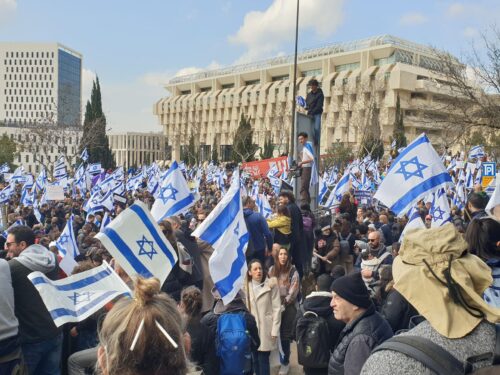Remarks from the chair of IDSF-Habithonistim
In the IDF and security circles, one term often used is “the war between the wars.” It refers to a campaign waged by the State of Israel against the strengthening of the terrorist players that threaten the country, first and foremost Iran. According to foreign publications, the State of Israel is responsible for the disappearance of Iranian scientists, for explosions destroying vehicles on the roads of Tehran, for targeted killings from the air in Syria, and for strikes against weapons depots in Lebanon.
But while the media and the public are spotlighting those daring raids, it’s important to remember that Iran isn’t sitting idly either. Iran is busy all the time. Rocket fire, commandos on the borders, drones, and UAVs – ultimately, it’s all Iran.
While recent years may have accustomed us to short rounds of fighting in Gaza that are financed and directed by Iran, earlier this year we received proof, in Jenin, that Iran can also run terror cells in Judea and Samaria. And now, after years of relative quiet, more and more security incidents are occurring along the State of Israel’s northern border.
First Gaza, then Jenin, and now Lebanon
In order to understand why the northern front is heating up at this particular time, it’s necessary to examine the geopolitical environment of our region from a broad perspective. Initially, the Iranians focused their activity on the Gaza Strip, and from one round to the next, we did indeed see a measurable improvement in the rocket precision and military capabilities of Hamas. However, while the capabilities of Hamas were improving, the IDF was dealing severe blows, time after time, to Hamas and its operatives. Hamas’s heavy losses, together with the Gazan leadership’s investment of money in terrorism rather than in improving the population’s standard and quality of living, generated unrest among the Gazan civilians. Their lives were becoming unbearable.
The Iranians very quickly understood that in Gaza, the price they paid in civilian unrest outweighed the benefit from the Hamas regime they were controlling, and so they had to make changes. One such change is the relatively new focus on arming Palestinian Islamic Jihad (PIJ) in northern Samaria. The Iranians began massive smuggling of money and weapons into Samaria through Jordan, while explicitly announcing their intention to turn northern Samaria into a second Gaza, and we saw the results during Operation “House and Garden” in Jenin.
However, in Jenin as in the Gaza Strip, the IDF bore down on the PIJ and critically damaged its military abilities. This time too, the Iranians understood that their current approach had exhausted itself.
At that stage, the Iranians decided to move the center of gravity for their activity to Israel’s northern front.
Hezbollah pushes the borderline
Considering recent events, such as the erection of Hezbollah tents in the Mount Dov area or the photo of IDF Chief of Staff Herzi Halevi inspecting the vicinity of the border, it might be assumed that Iran – through Hezbollah – is looking for an excuse to start a war against Israel. But that assumption isn’t accurate. The Iranians don’t want to start a war. They have no interest in squandering Hezbollah on a localized war that would take a great, irreversible toll on Nasrallah’s troops. However, it certainly is a purpose and a desire of theirs to wear away at the IDF, to force a challenge on the State of Israel, and – while they’re at it – to try to humiliate Israel.
What we’re looking at on our northern border is a significant change in Israeli–Lebanese relations. For many years, the northern front was kept relatively quiet. The quiet was preserved until last year, when Hezbollah taunted Israel by sending three unmanned aircraft toward the “Karish” maritime gas field. That incident may have ended in an Israeli victory, since the IDF successfully intercepted the three aircraft, but the truly significant incident occurred immediately afterward: an explicit threat by Hezbollah to foil Israel’s quest for legal and international approval of the Israeli claim to the gas deposit.
In response to the threat, Israel – amazingly enough – fell in line. The area, which was under Israeli control and was intended to be divided more or less equally between Lebanon and Israel, was turned over wholly to Hezbollah by the Israeli government. In return for what? For nothing.
When Israel yielded de facto to the voicing of terrorist threats by Hezbollah, we – as a movement – understood that such surrender leads Hezbollah to believe that Israel fears to confront it. Leaders of the IDSF-Habithonistim movement warned last year of exactly that problem. In real-time, before the agreement was signed, we petitioned against it. We assembled thousands of signatures, we researched the subject and then we showed our findings to the Knesset’s Foreign Affairs and Defense Committee.
But the signing took place. And in fact, when Hezbollah understood that it had defeated Israel in the maritime conflict – it moved on to the land-based conflict. This is exactly what we’re observing now: observation posts being constructed, soldiers patrolling along the border, security cameras being stolen, tents being set up on our territory, and provocations and disturbances at the village of Ghajar.
We mustn’t be a spider web
After Israel withdrew from Lebanon in 2000, Nasrallah addressed the Arab world in his famous Spider Web Speech. In that speech, Nasrallah compared the robustness of Israeli society to that of a spider web, saying Israeli society is contentious and fragmented to the point where its social robustness is as meager as a spider web’s.
Over 20 years, Israeli society has shown time and again that while the public does disagree and argue, the IDF – with its solidarity and robustness – would always stay out of those arguments. But recently we’ve seen the utmost irresponsibility displayed by retired senior officers and by current volunteers who refuse, for various political reasons, to report for the righteous mission of defending Israel’s security. By their refusal, those irresponsible people are materially endangering their own children’s lives.
They are grossly violating the spirit of comradeship, which is one of the IDF’s fundamental values. As you charge forward toward the enemy, at the risk of your life, you can do so because you trust your fellow soldier to charge forward along with you. But if your fellow soldier suddenly announces that for him, charging is conditional on all kinds of political considerations, then he sets off a chain reaction destabilizing the entire foundation that the IDF is built on. Refusing to report for duty, or no longer volunteering – call it what you like – must be condemned.
The IDSF-Habithonistim movement is uncompromisingly battling the phenomenon of refusal to report. It is an unworthy, unprincipled, un-Zionist phenomenon and it harms Israel’s security. Granted, it includes senior figures who have done service and bodily protected the State of Israel, and respect for their contribution is undimmed. But at the same time, it must be said explicitly: Whoever refuses is no tragic hero but rather someone behaving unacceptably toward the society and the State, and playing into the hands of our enemies. Not coincidentally, the same person who compared Israeli society to a spider web is examining how far he can push the borderline, figuratively and literally.
While we flourish, they wither
Our responsibility, as former senior officers in the security establishment and its various branches, is to present an accurate picture, not one that derives from propaganda or from ulterior motives. In this connection, it should be emphasized that concerning refusals to report, the figures presented in the media are inflated and exaggerated. As the Minister of Defense and the IDF Chief of Staff said only recently – the army is at full readiness.
Moreover, the enemy facing us must be viewed in its true proportions: It amounts to some thousands of Hezbollah troops. We are not confronting regular brigades and divisions, with tanks, attack helicopters, warships, or submarines. And the societal condition of the enemy must also be taken into account: Thousands of people have been killed and wounded in Lebanon’s civil strife, its economy is collapsing, morale in its domestic battles is low, and in actuality, the State of Lebanon is falling apart. To put it simply: While we’re flourishing, they’re withering.
This week I participated in a news panel on one of the media channels. When the program’s moderator asked the interviewee next to me, a major general in the reserves, if we could be defeated in the north, that man’s answer was yes – we could lose. I was floored. I say clearly, unambiguously, unmistakably that in the next campaign we will not be defeated. In the next campaign, we will win. Yes, it will be hard. Yes, there will be challenges. Yes, there may be fatalities and injuries – but the next time the IDF leaves Lebanon, it will leave behind no functioning, battleworthy Hezbollah forces. Nothing will stop us. However, as a society, we must pull ourselves together and take a clear stand against refusal to report for duty.





